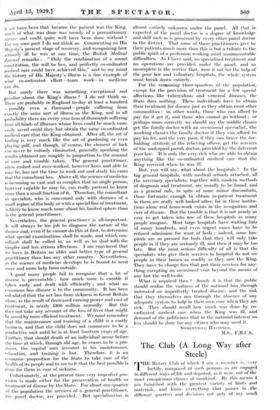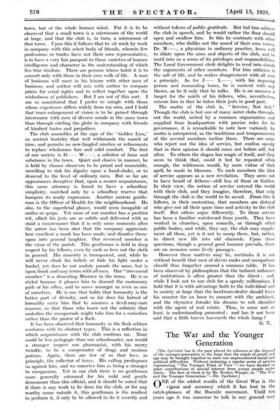The Club (A Long Way after Steele)
THE Rotar ( lub of which I am a nicniber is, very luckily, composed of such persons as are engaged in different ways of life and deputed, as it were, out of the most conspicuous classes of mankind. By this means I am furnished with the greatest variety of hints and materials, , and know everything that passes in the different quarters and divisions not only of my small town, but of the whole human mind. For it is to be observed that a small town is a microcosm of the world at large, and that the club is, in turn, a microcosm of that town. Upon this it follows that to sit week by week in company with this select body of friends, wherein few professions or trades have not their own representative, is to have a very fair passport to those varieties of human intelligence and character in the understanding of which lies true wisdom. There are persons whose habit it is to -consort only with those in their own walk of life. A man of business will meet in his leisure with other men of business, and author will mix with author to compare prices for serial -rights and to reflect together upon the wickedness of publishers. But I am not of this sort. I am so constituted that I prefer to mingle with those whose experience differs widely from my own, and I hold that truer enlargement of vision is to be gained through intercourse with men of diverse mindS in the same town than through circling the globe in company with friends of kindred tastes and prejudices.
The club assembles at the sign of the ' Golden Lion,' an ancient hostelry that well withstands the march of time, and permits no new-fangled niceties or refinements to replace wholesome fare and solid comfort. The first of our society- is D— W , a solicitor of fame and substance in the town. Quiet and elusive in manner, he is held by chance observers to be proud and unsociable, unwilling to risk his dignity upon a hand-shake, or to descend to the level of ordinary men. But so far are appearances deceptive that, upon a nearer acquaintance, this same attorney is found to have a schoolboy simplicity, matched only by a schoolboy reserve that hampers its ready expression. Another austere gentle- man is the Officer of Health for the neighbourhood. He also, to the superficial glance, would seem incapable of smiles or quips. Yet none of our number has a prettier wit, albeit his jests are so subtle and delivered with so staid a countenance that it is only some moments after the arrow has been shot that the company appreciate how excellent a mark has been made, and dissolve there- upon into general- laughter. Our reverend member is the vicar of-the parish. This gentleman is held in deep respect-by his fellows, even by such as love not the cloth -in general. His sincerity is transparent, and, while he will never cloak his beliefs or hide his light under a bushel, yet does he not unduly parade the same, but is upon frank and easy terms with all men. Our " irreverend member" is a dissenting Minister in the town. He is so styled because it pleases him to discard the customary garb of his office, and to move amongst us even as one of ourselves. He is one that- holds that humanity is the better part of divinity, and so far does his hatred of 'formality carry him that he assumes a devil-may-care manner, so that those who know not the- sobriety that underlies the masquerade might take him for a comedian rather than the pastor of a flock.
It has been observed that humanity in the flesh seldom conforms with its abstract types. This is a reflection in which acquaintance with the club confirms me. None could be less pedagogic than our schoolmaster, nor would a stranger suspect our pharmacist, with his merry twinkle, to be a compounder of drugs and noxious potions. Again, there are few of us that love, in .principle, the collector of taxes. • His calling predisposes us against him, and we conceive him as being a stranger to compassion. Yet in our club there is no gentleman more generally esteemed for his mild and gentle demeanour than this official, and it should be noted that if there is any work to be done for the club, or for any worthy cause outside it, this gentleman is the readiest to perform it, if only he be allowed to do it secretly and without tokens of public gratitude. But bid him address the club in speech, and he would rather the floor should open and swallow him. In this he contrasts with other members, who dislike not the sound of their own voices. Dr. M—, a physician in ordinary practice, loves well to dilate upon the aims and objects of the club, and to instil into us a sense of its privileges and responsibilities. The Local Government clerk delights to rend into shreds the arguments of other members. For him criticism is the salt of life, and he makes disagreement with all men a principle. As for J L—, with his imposing person and resounding tones, he is content with any theme, so be it only that he talks. He is on occasion a target for the mirth of his fellows, who, nevertheless, esteem him in that he takes their jests in good part.
The motto of the club is, " Service, Not Self." Though the club is but one of many sister clubs through. out the world, united by a common organization and supplied from headquarters with precise rules for its i governance, it is remarkable to note how variously its motto is interpreted, as the traditions and temperaments of the several members incline them. There are some who reject not the idea of service, but confess openly that in their opinion it should come not before self, but after. To others the slogan has magic of itself, and they seem to think that, could it but be repeated often enough, the wilderness would, by mere virtue of that spell, be made to blossom. To such members the idea of service appears as a new revelation. They seem not to have heard of Athens—still less of Sinai or Galilee. In their view, the notion of service entered the world with their club, and they imagine, therefore, that only through the club is the world to be saved. .From this it follows, in their. contention, that members are disloyal who give not all their spare time and activity to the club itself. But others argue differently. To them service has been a familiar watchword from youth. They have worked in churches, upon councils, or through other public bodies, and while, they say, the club may supple- ment all these, yet is it not to usurp them, but, rather, to direct new life into old channels. Upon these questions, though a general good humour prevails, there are on occasion some lively passages.
However these matters may be, methinks it is not without benefit that men of divers ranks and occupations should thus forgather around a common table. It has been observed by philosophers that the indirect influence of institutions is often greater than the direct : and, while I look not to our club for a speedy millennium, I hold that it is with advantage both to the individual and to society at large that the hardware-dealer should leave his counter for an hour to consort with the architect, And the rhymstcr forsake his dreams to rub shoulder with the agent of real estate. Thus, in some sort at least, is understanding promoted : and has it not been said that a little leaven leaveneth the whole lump ?
G. T.



















































 Previous page
Previous page